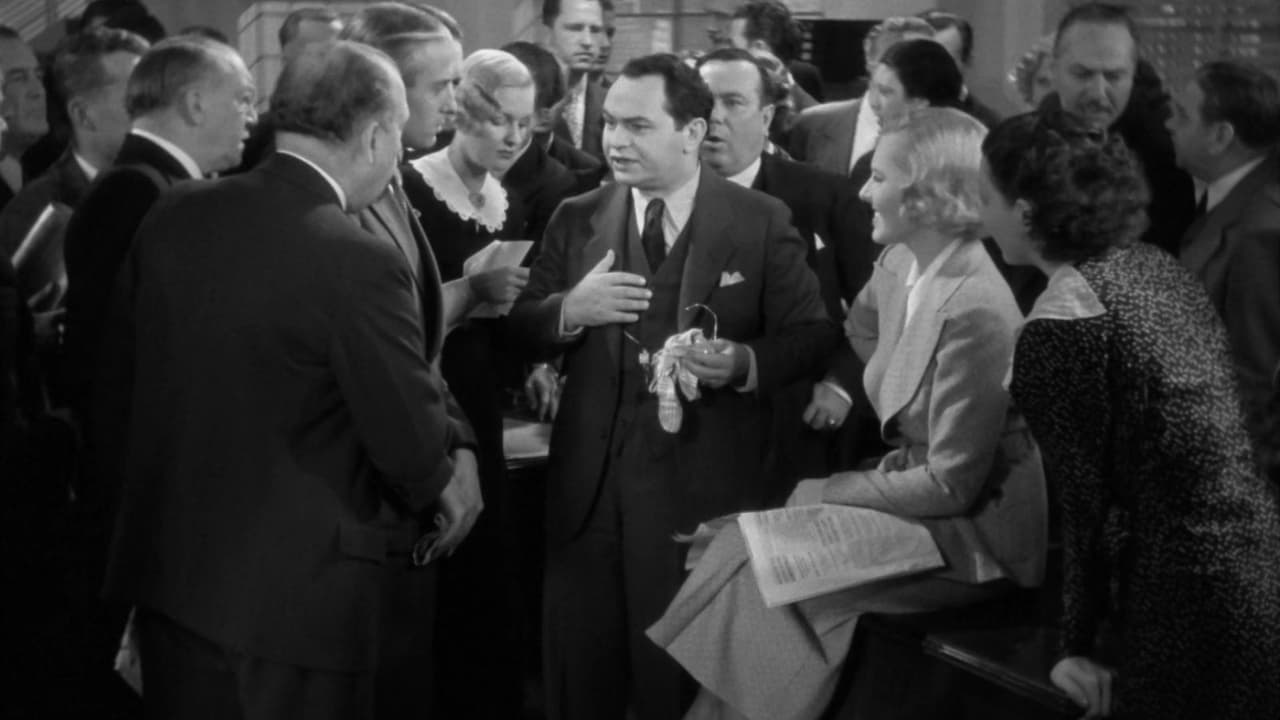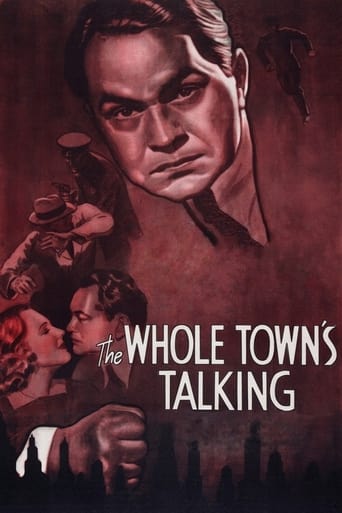GarnettTeenage
The film was still a fun one that will make you laugh and have you leaving the theater feeling like you just stole something valuable and got away with it.
Myron Clemons
A film of deceptively outspoken contemporary relevance, this is cinema at its most alert, alarming and alive.
Sienna-Rose Mclaughlin
The movie really just wants to entertain people.
Walter Sloane
Mostly, the movie is committed to the value of a good time.
dukeakasmudge
Soooo disappointing.I expected The Whole Town's Talking to be way better than what it was.It seemed like when something finally happens, the movie's almost over.I really had my hopes set high for this 1.When it was over, it was over.I didn't feel a thing.It wasn't Yay that was a great movie or even I'm so glad that's over, I just felt numb.When I 1st heard about The Whole Town's Talking which was a long time ago, I knew I just had to see it.After all this time I finally had a chance to watch it.I knew what time it was coming on & did everything I could to make sure I didn't miss it, only to be disappointed.I nodded off 3-4 times but kept myself awake.After watching this movie I should've just let myself fall asleep.Skip The Whole Town's talking & go see Larceny, Inc. It's WAY better & I promise, you won't be disappointed (Man, writing this review has been a struggle)
PamelaShort
Edward G. Robinson gives a winning performance in this excellent comedy, in which he flawlessly plays dual roles. I loved his portrayal of Arthur Ferguson Jones, a meek and gentle law abiding office clerk, who has a crush on his beautiful co-worker, the always delightful actress Jean Arthur. Problem is, kind-hearted Jones is an identical dead ringer in looks to a ruthless gangster, " Killer Mannion, " and one day big trouble begins for Jonesy as he is mistaken for the callous mobster. I have always enjoyed this well scripted film, finely performed by all the players involved in the comical antics. But all isn't funny for Arthur Jones when the gangster takes advantage of his identical twin, putting poor Jonesy in some tense situations. Edward G. Robinson's sweet character Jonesy is so adorable, I could bring him home to mother. If you are a fan of Jean Arthur and Edward G. Robinson and comedies 1930s style, you will find this most entertaining and amusing film, a very superb choice.
Robert J. Maxwell
Three major male figures emerged as stars from the Warner Brothers factory of the 1930s -- Bogart, Cagney, and Robinson. Of the three, Edgar G. Robinson is probably the most underrated. He was adept at tough roles ("Little Caesar," "Key Largo"), mousy characters ("Scarlet Street," "The Woman In The Window") and thoughtful men of principle ("The Stranger").Here he plays both ends of the spectrum of virtue. He's Arthur Ferguson Jones, a frightened and self-effacing clerk at a jewelry firm. He's also the scowling, murdering gangster on the lame named Manion, a more subtle version of Caesar Enrico Bandello.Since the two look almost identical, when Manion breaks out of the slams, the police are on the lookout for him and arrest Jones instead. It takes a long time to iron out the mistake, which reduces the terrified Jones to a neural shambles. "I tell you, my name isn't Jones, it's Manion. I mean, it isn't Janion, it's Mones!" The police finally give him a "free pass" identifying him as Jones and asking he not be molested by the authorities. But then Manion shows up, threatens to kill Jones, and confiscates the free pass every night to continue his scurrilous activities. After that, it really gets complicated.Excellent support is provided by the professional cast, including Jean Arthur in the role of the sassy blond who eventually realizes she, who has been scoffing at Jones' tentative advances, is really his princesse lointaine and he is the guy she truly admires and cares for.It's a little long. And it seems every possible permutation of the mixed identity plot has been explored. The idea itself is hardly fresh. It was the subject of Shakespeare's first play and goes back to the Masques of Ancient Greece.But Robinson is so good in both roles that it's an enjoyable and often funny story. You wouldn't know it was directed by John Ford if you hadn't already known it. (There is only one comic drunk scene.) Robinson enjoyed working with Ford and, in his memoirs, he writes that his friendly working relationship continued with "Cheyenne Autumn."
Dale Houstman
This movie is (correctly enough) billed as a "crime comedy" but that tone is not entirely maintained throughout the film, and to good effect. For one thing, Robinson (as "Jonesy") emanates a very palpable feeling of repression and yearning for a more romantic existence throughout the film, and this is underscored by his poetic ambitions, and the fact he named his cat "Abelard" for just two examples.But the most powerfully emotional scene in the film - and the one which most breaks the comedy constriction - is when Mannion is finally gunned down by his own men, entirely at "Jonesy's" direction. It is not a moment which is let off with comedic ease, and this is marvelously portrayed in a fleeting closeup of Robinson (as "Jonesy") as the gangs carts Mannion off to another room - the camera cuts away to a shot of "Jonesy's" face, and what one sees there (underscored by an anguished bark) is a true second of real anguish and guilt over what he has just be responsible for. Although Mannion was a murderer (and this "crime" of "Jonesy's" is partly in response to his discovering Mannion was trying to gt him killed), the murder is not tossed off without emotional undertones of true anxiety. It is a great sequence, possibly entirely a matter of Robinson's skill and feel for the character.The comedic moments go down easy, Jean Arthur is at her tough girl best, and the film abounds with the "usual suspects" of Hollywood character actors. It is well worth viewing as a light farce. But - for this viewer - that one quick brush with actual internal pain somehow puts the rest of the film in a briefly glimpsed and different universe of real human morality. If for no other reason, (and there are many) that one tiny moment makes this film highly recommendable.

